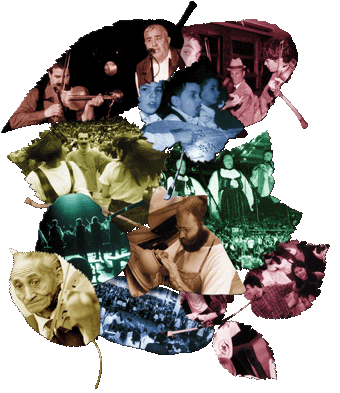The Dance-house Guild's Story
The "táncház method" is one of the best practices
In the past - owing to the lack of other possibilities - dance events meant almost the only means of amusement for the village communities.
The common dance is a very important element of the folk customs, closely connected to the milestones in a human life (nameday, joining the army, wedding), to the remarkable days of the year (Carnival, Easter, Christmas) or to work (sheep measuring in springtime, harvesting, wine making). The lads engaged a band for each season, renting an appropriate house; that is they choose a dance-house. That way dance-house 'táncház' didn't simply mean the place, but also the event itself.
In the order of the táncház there are solo, couple and often round dances following each other, accompanied by the appropriate music, according to the dance types. Despite the fixed style, improvization, the variation of musical elements and dance figures together plays an important role. The Carpathian Basin - resulting from the differing development of the individual regions and the coexistence of peoples of different cultures - boasts uniquely rich and varied folklore treasures. To our great luck, the people in our region have preserved and still use the majority of customs of village life in their original forms.
The experience of the still living táncház has motivated the fantasy of urban youth, interested in their own roots. The tunes, known only from books were filled with emotions and the dance steps, stiffened by choreographs, were filled with life.
So a kind of re - learning has started, but not as some dull subject, but directly from the living sources. Our masters, who have become our personal friends - the tradition preserving singers, musicians and dancers - are still frequent guests in our urban táncház clubs, at our festivals and in our summer camps.
That way the work of scholars - Béla Bartók, Zoltán Kodály, György Martin and their followers - has gained new purpose in the practice of the táncház revival, going on since the early 70's. Folk traditions haven't remained a pile of museological facts and figures, folk music and folk dance are not solely the base for composers' and choreographers' works, but they live on, preserving the original function, the constant changing, while adding to our souls.
The method of the táncház - learning while having fun - that serves as an example all around the world, is very simple. It needs a good ensemble, to the acoustic(!) music of which the teaching couple presents the steps. Anybody can join the students' circle, but they can soon dance "freely", even with the variation of some figures. This does not mean total freedom, but the individual use of the already known styles.
Beside the exciting musical tone and the characteristic dances, the mystery of the táncház lies in the fact that we have to fight for it a little...
The Dance-house Guild was founded in 1990, as a nationwide social organization of the táncház movement and the connected branches of folk art. Among its members there are professional artists, amateur performers, instructors, ethnographers as well as those who "only" like folk music and folk dance. The Guild is led by the management, elected democratically.
Among the Guild's aims are the realization of programs and publications, the collections of folk materials and educational projects, cooperating with other institutes and organizations. We would like it if more and more people became acquainted with and used the values of the táncház in their everyday lives.
The Dance-house Guild is an active member of the Hungarian Council of Music. We are eager to make contact with the institutions and organizations of legislation, government and self-government. The Guild regularly cooperates with the Budapest Spring Festival, the Association of Folk Art Unions, the Heritage Children Folk Art Ensemble and the Association of Hungarian Music Schools. Also with the Hungarian Institute for Culture, the Heritage House, The Institute for Musical Science of the Hungarian Academy of Sciences, the Hungarian Radio and the Hungarian Television.
Our magazine, folkMAGazin , now issued six times a year, has established in 1994.
Beside the Táncház Festival and Fair and The Opening Táncház Ball are also important events which the guild organizes and manages.
The honorary president of the Dance-house Guild: Timár Sándor
Members of the management: Nagy Tímea, Berán István (representative), Havasréti Pál, Kiss Ferenc, Szűcs Gábor
Dance-house Guild (Táncház Egyesület)
H-1255 Budapest, P.O. Box 153
Phone / fax: (36-1)2143521



